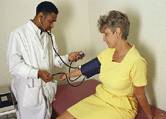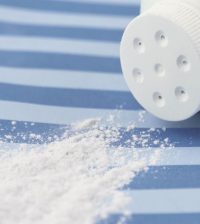- Gas Stoves Could Leave Your Lungs Vulnerable to Nitrogen Dioxide
- Key Therapy Equally Effective for Women, Men With Narrowed Leg Arteries
- Doctors Describe Texas Dairy Farm Worker’s Case of Bird Flu
- Does Preschool Boost Kids’ Long-Term Academic Success? Study Finds Mixed Results
- AI Might Spot Rare Diseases in Patients Years Earlier
- An Orangutan Healed Himself With Medicinal Plant
- Quit-Smoking Meds Not Working for You? Try Upping the Dose
- Fewer Americans Are Suffering Most Dangerous Form of Heart Attack
- Even Skipping Meat for One Meal Helps Liver Disease Patients
- You May Not Have to Fast Before Catheter-Based Heart Test, Study Suggests
Doctors Really Do Raise Your Blood Pressure


Patients’ blood pressure readings are notably higher when they’re taken by a doctor than by a nurse, a new study finds.
This link between doctors and higher blood pressure readings is known as the “white coat effect,” and is believed to be the result of patients being more nervous when examined by a physician.
This effect has been noted in a number of previous studies, but this new paper is the first to confirm it, according to the study authors.
The investigators analyzed data from more than 1,000 people who had blood pressure readings taken by both doctors and nurses during the same visit. The readings taken by doctors were significantly higher than those taken by nurses, the study authors found.
The findings, published in the current issue of the British Journal of General Practice, should lead to changes in the way blood pressure readings are taken, according to lead author Dr. Christopher Clark, of the University of Exeter Medical School, in England.
“Doctors should continue to measure blood pressure as part of the assessment of an ill patient or a routine check-up, but not where clinical decisions on blood pressure treatment depend on the outcome,” Clark said in a university news release.
“The difference we noted is enough to tip some patients over the threshold for treatment for high blood pressure, and unnecessary medication can lead to unwanted side-effects,” he said.
“Some patients may be erroneously asked to continue to monitor their own blood pressure at home, which can build anxiety. These inappropriate measures could all be avoided by the simple measure of someone other than a doctor taking the blood pressure recording,” Clark added.
He suggested that researchers “should also think carefully about how to account for this effect in studies that compare treatment by doctors and nurses. Some studies have concluded that nurses are better at treating [high blood pressure], when in fact those findings could be down to this recording bias.”
More information
The U.S. National Heart, Lung, and Blood Institute explains how to prevent high blood pressure.
Source: HealthDay
Copyright © 2024 HealthDay. All rights reserved.










